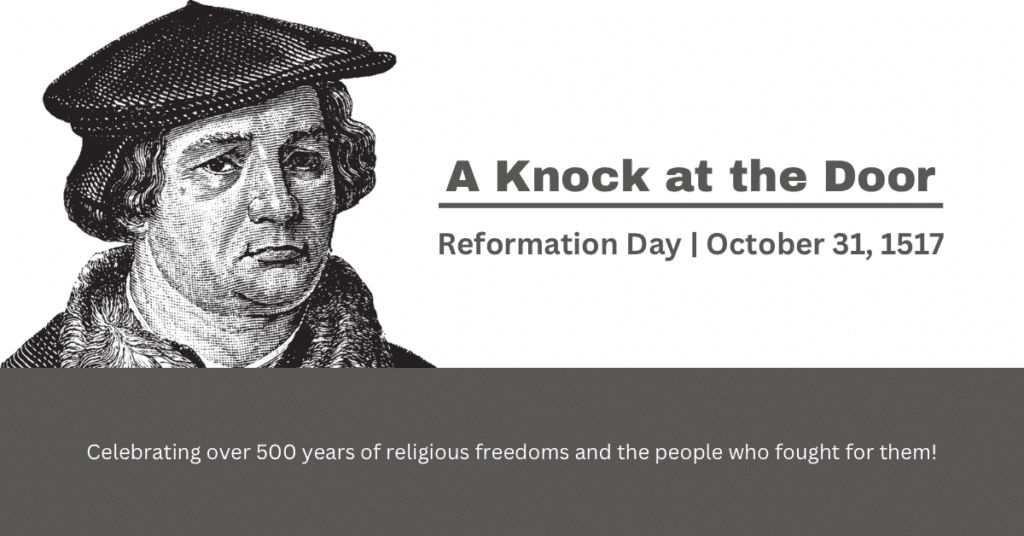
The evening of October 31 will bring many little “knocks” at the door as children comb through their neighborhoods seeking candy from strangers. Amid the candy craze, let me encourage you to take a moment to remember and inform your children about what happened on October 31 over 500 years ago. On October 31, 1517, a knock at the door launched a revolution that still reverberates today!
On that day, Martin Luther posted his ninety-five theses on the wooden door at the Wittenberg Castle Church. This posting set forth objections to the unjust practices of the ruling authorities of his day. This posting also began a freedom movement championing individual rights of conscience. Whether he used a hammer and nail, or whether he glued the document to the door, the “knock” on the door launched the Protestant Reformation and forever changed the world. In fact, the Protestant Reformation helped usher in many individual religious freedoms that we enjoy today. As a result, much of the world recognizes and celebrates October 31 as Reformation Day!
And while we celebrate the brave men who laid the foundation for this reformation, let us not forget the courageous women who stood up and spoke up for freedom. For example, soon after that knock on the Wittenberg Castle Church door, Argula von Grumbach began a letter-writing campaign in defense of students’ religious freedoms. As Argula wrote: “What I have written to you is no woman’s chit-chat, but the word of God; and (I write) as a member of the Christian church, against which the gates of Hell cannot prevail.”1 Around that same time, Katharina Schutz Zell engaged in a letter-writing campaign in defense of the goodness of marriage. As she wrote: “I cannot excuse myself and persuade my conscience that I should be silent about these very great devilish lies…” Both Argula and Katharina championed freedom of conscience on a foundation of liberty started on that first Reformation Day.
Some 500 years later, two other courageous women also could not remain silent in the face of injustice. As public school teachers, Elizabeth Mirabelli and Lori West refused to remain silent when instructed by their school district to keep students’ gender transitions secret from the students’ parents. Because of their Christian convictions, Elizabeth and Lori refused to lie to parents. Instead, they believed that parents should be the primary decision-makers about the medical conditions of their children. So, Elizabeth and Lori determined to stand up and speak up for the parents. On September 14, 2023, a federal judge agreed with Elizabeth and Lori and entered an order blocking the school district from requiring them to violate their Christian convictions. The judge explained as follows:
The school’s policy is a trifecta of harm: it harms the child who needs parental guidance and possibly mental health intervention to determine if the [gender] incongruence is organic or whether it is the result of bullying, peer pressure, or a fleeting impulse. It harms the parents by depriving them of the long recognized Fourteenth Amendment right to care, guide, and make health care decisions for their children. And finally, it harms plaintiffs [teachers] who are compelled to violate the parent’s rights by forcing plaintiffs [teachers] to conceal information they feel is critical for the welfare of their students – violating plaintiffs’ religious beliefs.3
This case represents an encouraging trend as courageous women like Elizabeth and Loristand for the rule of law and speak up for individual rights. So, this October 31 let’s celebrate Reformation Day as we recognize the courage of reformers past and present.
1Kelly M. Kapic and Hans Mdueme eds. Reading Christian Theology in the Protestant Tradition (Bloomsbury T&T Clark, 2018), 391. 2Kapic, Reading Christian Theology, 393. 3Mirabelli v. EUSD Bd of Education (S.D. Calif. 2023), 35.
